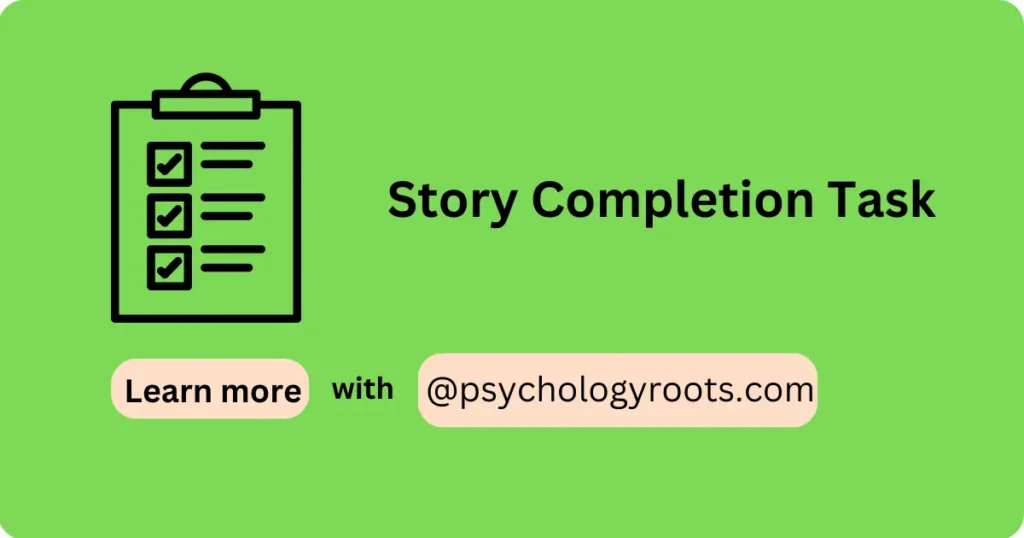Table of Contents
Story Completion Task
Here in this post, we are sharing the “Story Completion Task”. You can read psychometric and Author information. We have thousands of Scales and questionnaires in our collection (See Scales and Questionnaires). You can demand us any scale and questionnaires related to psychology through our community, and we will provide you with a short time. Keep visiting Psychology Roots.
About Scale Name
Scale Name
Story Completion Task
Author Details
Craig A. Anderson
Translation Availability
Not Sure

Background/Description
Story completion is a method used or qualitative research, wherein participants express their views on a topic by completing a story normally started by the researcher. This post will give you an overview of the method, including some tips and practicalities to think about when designing a research study that uses story completion.
Story completion can provide access to a wide range of responses, including responses that may not be socially desirable. When participants are encouraged to write hypothetically and in third-person, they don’t have to justify their answers or take ownership of them like they would if they were asked about the research topic in a more straightforward way in an interview or a focus group. Story completion is therefore suitable for studying topics that participants may find difficult or uncomfortable to talk about, but also for identifying discourses associated with certain topics.
Administration, Scoring and Interpretation
- Choose the appropriate test. The first step is to choose the appropriate test for the individual being assessed. There are many different types of psychological tests available, and each one is designed to measure a specific construct or set of constructs. For example, there are tests that measure intelligence, aptitude, personality, and psychopathology. The psychologist will need to consider the individual’s age, ability level, and the purpose of the assessment in order to choose the most appropriate test.
- Obtain informed consent. Before administering the test, the psychologist must obtain informed consent from the individual being assessed. This means that the individual must be informed of the purpose of the test, the procedures involved, and the potential risks and benefits of participating. The individual must also sign a consent form indicating that they understand and agree to participate in the assessment.
- Prepare the testing environment. The testing environment should be quiet, comfortable, and free from distractions. The psychologist should also make sure that the individual has the necessary materials to complete the test, such as pencils, paper, and a stopwatch.
- Administer the test. The psychologist should follow the instructions in the test manual carefully to ensure that the test is administered correctly. The psychologist should also be aware of the individual’s responses and any potential challenges they may be facing.
- Score the test. After the test is complete, the psychologist will need to score the test. The scoring procedures will vary depending on the type of test. The psychologist should carefully follow the instructions in the test manual to ensure that the test is scored accurately.
- Interpret the test results. Once the test is scored, the psychologist will need to interpret the results. The interpretation of test results is a complex process that requires the psychologist to have a thorough understanding of the test and the individual being assessed. The psychologist will need to consider the individual’s background, their responses to the test, and the norms for the test in order to make accurate interpretations.
Reliability and Validity
N/A
Available Versions
03-Items
Reference
- Dill, K.E., Anderson, C.A., Anderson, K.B., & Deuser, W.E. (1997). Effects of aggressive personality on social expectations and social perceptions. Journal of Research in Personality, 31, 272-292.
- Bushman, B.J., & Anderson, C.A. (2002). Violent video games and hostile expectations: A test of the general aggression model. Personality and Social Psychology Bulletin, 28, 1679-1686.
Important Link
Scale File:
Disclaimer
Please note that Psychology Roots does not have the right to grant permission for the use of any psychological scales or assessments listed on its website. To use any scale or assessment, you must obtain permission directly from the author or translator of the tool. Psychology Roots provides information about various tools and their administration procedures, but it is your responsibility to obtain proper permissions before using any scale or assessment. If you need further information about an author’s contact details, please submit a query to the Psychology Roots team.
Help Us Improve This Article
Have you discovered an inaccuracy? We put out great effort to give accurate and scientifically trustworthy information to our readers. Please notify us if you discover any typographical or grammatical errors.
Make a comment. We acknowledge and appreciate your efforts.
If you have any scale or any material related to psychology kindly share it with us at psychologyroots@gmail.com. We help others on behalf of you.